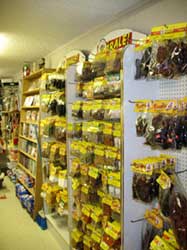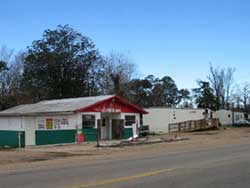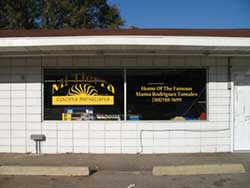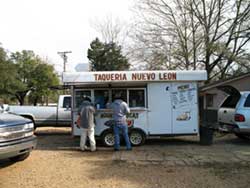The Mexican Community of Forest Hill, Louisiana
Foodways and Music
Foodways
Mexican foodways and music are an integral part of religious and secular celebrations. Some of the most popular foods include enchiladas, tamales, tacos, tostados, taquitos, carnitas, pozole, barbacoa, menudo, and mole sauces, among other foods traditional to Mexico. Early migrants, however, did not have ready access to familiar foods from home. Fernando Martínez noted that when he first arrived in the mid-1990s, there were “no tortillas, no pepper, no nothing.” For this reasons, whenever workers returned home to Mexico for a visit, they brought back several boxes of tortillas and other foods difficult to obtain in the area. These foods would then be distributed to each family. Prior to the more recent opening of Hispanic-oriented businesses, a Mexican man drove his pick-up truck from nursery to nursery each day selling Mexican brand products that included cold drinks, cookies, crackers, candy, and canned goods that he acquired from outside the area.
Today Mexican foods and products are more readily available. There is now a convenience store called La Mexicana and a Mexican restaurant called Mi Tierra Cocina Mexicana located in Forest Hill. La Mexicana was opened approximately five years ago by Victoria Carranza and her husband. The store caters primarily to local Hispanic workers and was the first Hispanic-oriented “retail” business in Forest Hill. The present store is located in a trailer, next to the original store, which was taken for highway construction (Figs. 26 & 27). Victoria started out selling Mexican foods, but has since expanded into selling DVDs and CDs, religious paraphernalia such as candles and rosaries, clothing for baptisms and quinceañeras, and some herbal medicines requested by customers. More recently she has begun to sell boots, cowboy hats, and leather wallets that she purchases through a catalog. Her biggest seller, however, is calling cards.

Figure 26-La Mexicana, a convenience store owned by Victoria Carranza and her husband. It was the first “retail” business to specialize in the sale of Mexican goods.

Figure 27-The original store is painted in the colors of the Mexican flag, but it has since been condemned for highway construction.
Irma Rodriguez, the owner of Mi Tierra Cocina restaurant, is originally from the city of Panuco, in Veracruz State and has lived in the United States for approximately twenty-four years. Prior to moving to Forest Hill she lived in Natchitoches. Around 2003, Irma and her husband were passing through the area when she noticed a business with “Spanish writing” on its façade. She thought it strange that Mexicans might be located in such a rural part of Louisiana and asked her husband to stop the car so that she might investigate. The business she saw was La Mexicana, the store owned by Victoria Carranza. Shortly thereafter, Irma began to sell homemade baked goods twice a month after mass at the Forest Hill Catholic Church. Her goods sold out quickly each time and she came to realize the demand for homemade Mexican cooking might support a restaurant. In 2004, she moved her family to the area and opened the town’s only Mexican restaurant (Fig. 28).

Figure 28-Mi Tierra Cocina Mexicana owned by Irma Rodriguez. It is the only Mexican restaurant in Forest Hill. Workers can also purchase Mexican brand named goods and send money home to their families in Mexico.
In addition to her restaurant, Irma is involved in other business ventures. On one side of her restaurant is a mini-mart that contains several shelves of Mexican brand goods. She also has a refrigerated case from which she sells Mexican cheeses and other products, when available. While Mexican workers eat at her restaurant during the weekday, Irma said that it is on Saturdays and Sundays that the restaurant is busiest. During the week, she said, most workers pack their lunch for work. On Saturdays she makes barbacoa and on Sundays, menudo. Her specialty, however, is tamales. Irma’s tamales are so well-known that she was invited to take part in the Smithsonian Institute’s annual Folklife Festival during the summer of 1997. Irma also operates a money transfer business that allows migrants to send money home to their families in Mexico. Her son Eddie, who works at a local bank, helps her with this aspect of the business.
When workers were asked which foods were characteristic of the San Miguel de Allende area, carnitas and barbacoa were mentioned over and over again. Irma Rodriguez also stated that she added carnitas to her menu to accommodate the requests of workers from the San Miguel area. When it was pointed out that these two foods are eaten throughout much of Mexico and the Hispanic Southwest, several workers noted that they are especially popular among the people of that region. More than one person also made the observation that while people throughout Mexico may eat the same foods, there are regional differences in the way in which they are cooked.
A mobile “taqueria” is also located in the center of town and is named “Taqueria Nuevo Leon” (Fig. 29) The taqueria specializes in the sale of tacos, tortas, and gorditas. In addition, aguas frescas (non-carbonated beverages made from fruit) are also sold at the stand. Joaquina Canada, who has lived in Forest Hill for thirteen years, has operated the stand for the past five years. One interesting reflection of the San Miguel connection is the fact that Joaquina uses corn tortillas, rather than wheat tortillas in her dishes. In northern Mexico and the United States, on the other hand, wheat tortillas are more popular (Byers and Tuckwiller, 2004).

Figure 29-Taqueria Nuevo Leon is a large mobile food cart that has been selling Mexican food to locals for the past five years.
As in Mexico, there is also a tradition of selling food and other goods informally. One naturalized resident, for example, owns a catering business and prepares hot food at his home that he sells from nursery to nursery each morning. This individual sells tortas, breakfast burritos, and plates with rice, beans, and carne asada, among other foods. Because this person aims to provide workers with fresh food, he rises as early as 3:00 am to start cooking. In addition to this individual, several workers also sell tamales directly from their homes on a word-of-mouth basis.
Another individual returns to Mexico approximately every two weeks to deliver items to family members in Mexico and returns with goods for workers in Forest Hill. This person also often delivers money to the families of workers in Mexico and returns with a signed note from the family that states they received the money. This entrepreneur will also bring back clothes and care packages from the families for the workers.
Chain businesses in the area are well aware of the growing Mexican presence in the area, but do not sell as many Mexican foods as might be expected. A local convenience store called Leebo’s, for example, sells tortillas, but not much else in the way of Mexican foods. The manager of the store attributed this to the fact that the store is unable to obtain them. At the local grocery store, called Water Street Market, which is located to the east in Lecompte, only a few Mexican products are sold. This includes a shelf containing tortillas, refried beans, and salsas. One of the managers of the store mentioned that they “mostly sell meat to them, especially pork.” She went on to say that they do not sell more Mexican foods because they do not know where to purchase it. Although Water Street Market does not sell many Mexican brands, it started a money wiring service a couple of years ago to take advantage of the growing Hispanic presence in the area and their need to send money home to their families.
The difficulty of obtaining Mexican foods and goods was mentioned by every business person. Irma Rodriguez and her husband drive to Houston once a month to purchase supplies for their restaurant. Victoria Carranza, on the other hand, goes to Atlanta once a month to procure the stock for her convenience store. Although Atlanta is much further away than Houston, Victoria said that the lower costs there make the journey worthwhile. Only a few distributors of Mexican foods actually deliver their products directly to these businesses. The Mexican meat producing company FUD, which is owned by the Mexican conglomerate Sigma Alimentos, provided Victoria with a refrigerator case and delivers their products to her store. In addition, she is supplied with tortillas once a month by a Texas distributor known as Hernando and Soles.
Mexican foods and goods are increasingly available in Forest Hill, but workers often have to drive to larger cities to purchase certain Mexican products. Several workers, for example, drive north to Alexandria to purchase their supplies at Wal-Mart. Others drive to Houston to shop at a Southwest Supermarket chain called “Fiesta” that specializes in Mexican foods and products.
One popular food tradition that pulls community members together is the tradition of barbacoa (barbecue). Unlike barbecues in the United States, Mexican barbacoas in Forest Hill consist of goat (cabrito), rather than pork or beef. The goat is put into a large pot, with maguey leaves (a type of cactus known as agave) placed on top, and steamed (al vapor). Because stores in the region do not sell goat, they must buy the meat from farmers in the area who raise goats. At some get-togethers a pig might also be roasted and other traditional Mexican foods will be prepared.
Music
Traditional and popular music provide important links to an immigrant’s homeland. A few workers were said to play musical instruments for their own personal enjoyment, but all community members have access to Mexican music on CDs that they purchase in the region or during visits back to Mexico. For important events, bands from the Houston area are hired to play. These bands typically play for five hours and charge according to the type of music played.
Mariachi music is probably the Mexican musical genre most familiar to Americans due to the influence of the mass media. Mariachi music is distinctive for the charro (Mexican cowboy) attire worn by the musicians and the instruments they play, including violins, trumpets, vihuela, guitarrón, and guitars. These bands are hired to play at a variety of celebrations in Forest Hill, including weddings, birthdays, quinceañeras, and the feast day of the Virgin of Guadalupe.
Among the younger generation, Duranguense and banda are especially popular. Banda is associated with the western Mexican state of Sinaloa and is a very percussive music that employs many brass instruments. Duranguense, on the other hand, is a musical style developed by Mexican migrants from the state of Durango who live in the city of Chicago. The musical style is similar to banda, but differs based on its use of electric instruments, greater use of percussion, faster rhythmic pace, and fewer band members.